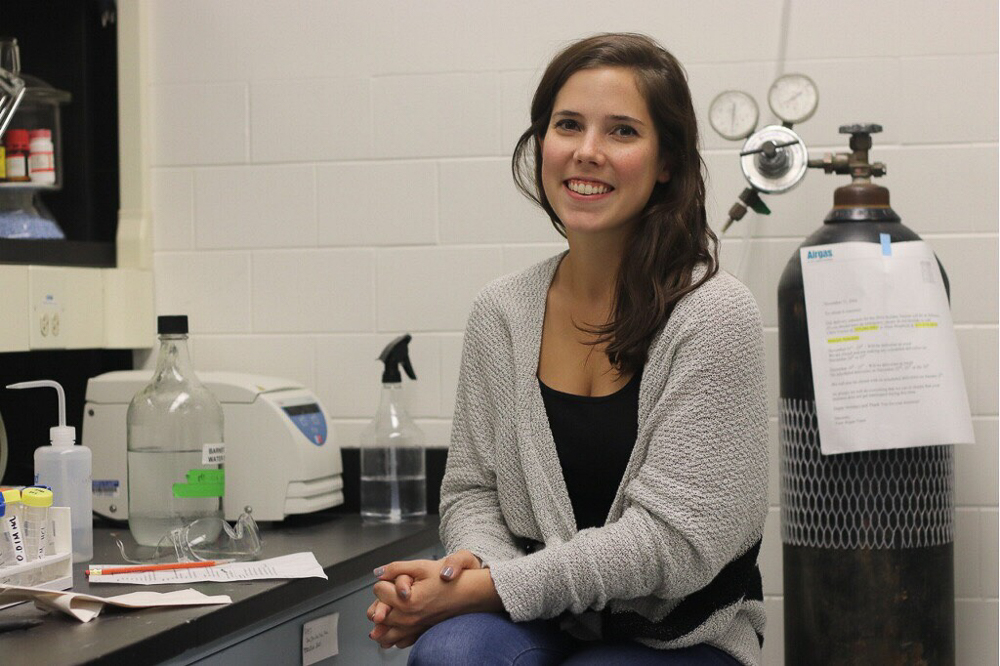University student ‘Chasing Genius’ for $25,000
Anna Waller, a PHD graduate student researching a project to end world hunger. She is one of 15 finalist for her project submitted to National Geographic.
Sep 14, 2017
Anna Waller, a predoctoral student in Food Sciences and Nutrition, is competing in National Geographic’s “Chasing Genius” contest for a chance to win $25,000.
Waller has been selected as one of 15 finalists. If she were to win, the money would go to combatting malnutrition among infants in Liberia.
According to the National Geographic website, Chasing Genius is a digital community, which was designed to inspire and enable people to share stories and turn their ideas into motivations for change in the world.
A one-minute video proposal was required for participation in the contest in which the contestants explained their ideas on how to better the world in one of three categories: sustainable planet, global health or feeding nine billion.
Waller entered the competition under the “feeding nine billion” category.
Get The Daily Illini in your inbox!
Ideas were evaluated on the following criteria: innovation, inspiration, creativity and its ability to work successfully.
Waller said that she attended a conference at the Borlaug Summer Institute on Global Food Security, which ultimately provided her with the necessary components to enter the competition as her group of six graduate students conducted research on the malnutrition among infants in Liberia.
According to Purdue University’s website, the U.S. Borlaug Summer Institute on Global Food Security is an annual two-week long learning program for graduate students attending U.S. institutions who are interested in developing a holistic understanding of the conceptual challenges around global food security.
The task (assigned at the conference) was to propose an idea which would serve as a solution to food security in Liberia, Waller said.
“My colleague recommended we focus on child nutrition because the childhood malnutrition there is a big problem,” Waller said. “It’s perpetuating a poverty cycle for many families. If their children don’t receive good nutrition, then they can’t have prosperous healthy lives.”
According to Waller’s project video submission, even though half of the 4.4 million people in Liberia live in rural areas where agriculture is the main source of income, most are malnourished and live on less than $1.25 per day.
Her project explains that one in three Liberian children are stunted, which is mainly caused by the inadequate baby food.
“At the University, we study solutions to malnutrition,” Waller said.
Based on the input from her professor and colleagues, Waller’s team decided to use indigenous, underutilized Liberian vegetables to come up with an improved instant formula to the one currently in use — a cassava formula lacking in essential fats, proteins and nutrients.
Currently, the infant formula contains less than two percent daily recommended fat, 27 percent daily recommended protein and 15 percent daily recommended vitamins and minerals.
Her project proposes to fix the malnutrition problem by promoting “a healthy start to life.”
By adding three locally grown indigenous crops to the current formula — moringa, amaranth and banana — it can add up to nine times the essential fats — three times the protein and three times the vitamins and minerals than its current formula allows.
“Some of the ingredients for these complementary foods, if well balanced, can contribute to a higher content of quality protein, iron and vitamin A, which are limiting in the diets of children living in households with food insecurity,” said Juan Andrade, professor in Food Science and Human Nutrition.
He said that adequacy of complementary foods is not only about nutrient content, flavor, texture and frequency, but also about the time of introduction, safety concerns and the care and feeding practices.
“Anna and her team’s product design includes this development paradigm, which is a solid and feasible idea,” Andrade said.
Voting for the National Geographic Chasing Genius Competition website is open until Friday on the contest website.






